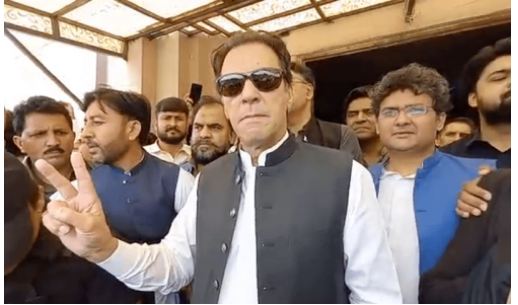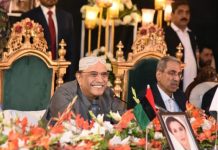Verdict announced by IHC division bench; Imran’s legal team files fresh petition seeking bar on his arrest in any other case.
ISLAMABAD, AUG 29: The Islamabad High Court (IHC) on Tuesday suspended PTI Chairman Imran Khan’s conviction and three-year sentence in the Toshakhana case.
The much-anticipated order was announced by a division bench comprising Chief Justice Aamer Farooq and Justice Tariq Mehmood Jahangiri on the former prime minister’s appeal against his prison term.
A detailed judgment is awaited.
On August 5, a trial court in Islamabad had convicted the PTI chief in the case filed by the Election Commission of Pakistan (ECP) that involved concealing details of state gifts and jailed him for three years. The verdict meant he was disqualified from contesting general elections for five years.
Imran had subsequently filed an appeal in the high court against his conviction. He had also approached the Supreme Court (SC) against the IHC’s decision to remand the case back to the trial court judge who had convicted him.
Last week, however, the SC had acknowledged “procedural defects” in Imran’s conviction but had opted to wait for the IHC decision on Imran’s plea. The court’s observations had drawn the ire of the Pakistan Bar Council, which said there should be no “interference” in matters pending before the subordinate judiciary.
A day ago, ECP’s counsel Advocate Amjad Pervaiz concluded his arguments and urged the court to issue a notice to the state to make it a respondent in the case. For his part, Imran’s lawyer Latif Khosa had said he had no objections to Pervaiz’s plea but had also expressed that the action was not required by the law.
In a post on X (formerly Twitter) last night, former interior minister Rana Sanaullah said, “He [Imran] will not come outside [of the jail] — release is not possible, [he] will have to face the prosecution in other cases!”
Ahead of today’s proceedings, PTI lawyers Babar Awan and Salman Safdar reached the IHC. Speaking to media persons outside court, Awan said their fight was not just for a single case or one judgment.
“You all are in a bigger prison and we want to free all of you,” he said.
Later, Dawn.com’s correspondent at the site said Imran’s sisters Aleema Khan and Uzma Khan had also reached the court.
PTI seeks bar on Imran’s arrest in other cases
Meanwhile, Imran’s legal team filed a fresh petition in the IHC today seeking directives to refrain authorities from further “illegal and unjustified arrest” of the former premier in any case filed against him after August 5, when he was convicted in the Toshakhana case.
The plea, a copy of which is available with Dawn.com, mentions the cipher case — registered by the Federal Investigation Agency on August 15 — as one of the FIRs under which the PTI chief is seeking protection from arrest. The FIA had last week grilled Imran in the said case, which invokes the Official Secrets Act, for over an hour at the Attock Jail.
Filed through Barrister Salman Safdar, the petition named the state as a respondent and alleged that the cipher case had been filed against Imran “with malafide intentions” and termed it of “bogus nature”.
The plea stated that the “only remedy available to avoid unjustified, illegal and straightaway arrest” was by invoking Article 10 (safeguards as to arrest and detention) of the Constitution for the “protection of his fundamental rights and safeguards”.
The petition further said that the petitioner would “suffer irreparable loss in case he is arrested for another offence, which he has not committed”.
It further expressed the apprehension that the PTI chief’s “political adversaries and opponents would be able to further their nefarious designs and political ambitions in the absence” of the IHC’s “kind intervention”.
Prison conditions
In a separate development yesterday, the Attock Jail authorities submitted a report to the Supreme Court, detailing the facilities being provided to the ex-prime minister.
The report, submitted by the jail superintendent to comply with the SC’s August 24 order, states that meals were being provided periodically on the convict’s demand and that his washroom facilities have also been improved.
Previously, Imran’s wife, Bushra Bibi, had moved an application before the Supreme Court wherein she expressed apprehensions that her husband’s health was deteriorating fast, threatening his life.
The facilities provided to the ex-premier had been upgraded after Additional District and Sessions Judge Shafqatullah Khan submitted an inspection report based on his visit to the prison on August 15.
The report had declared that Imran’s “grave concern” regarding a lack of privacy around his prison cell’s toilet facilities in the jail due to a CCTV camera’s presence was “genuine” and pointed to a violation of prison rules.
Subsequently, Punjab Prisons Inspector General Mian Farooq Nazir had said Imran had been shifted to a new cell on August 19, where the washroom had been renovated with five-foot-high walls.
Toshakhana case
The case, filed by lawmakers of the then coalition government, was based on a criminal complaint filed by the ECP.
The case alleged that Imran had “deliberately concealed” details of the gifts he retained from the Toshaskhana — a repository where presents handed to government officials from foreign officials are kept — during his time as the prime minister and proceeds from their reported sales.
According to Toshakhana rules, gifts/presents and other such materials received by persons to whom these rules apply shall be reported to the Cabinet Division.
Imran has faced a number of legal issues over his retention of gifts. The issue also led to his disqualification by the ECP.
On Oct 21, 2022, the ECP had concluded that the former premier had indeed made “false statements and incorrect declarations” regarding the gifts.
The watchdog’s order had said Imran stood disqualified under Article 63(1)(p) of the Constitution.
Subsequently, the ECP had approached the Islamabad sessions court with a copy of the complaint, seeking proceedings against Imran under criminal law for allegedly misleading officials about the gifts he received from foreign dignitaries during his tenure as the prime minister.
On May 10, Imran was indicted in the case. However, on July 4, the IHC had stayed the proceeding and directed ADSJ Dilawar to re-examine the matter in seven days, keeping in view eight legal questions he framed to decide the maintainability of the Toshakhana reference.
The questions had included whether the complaint was filed on behalf of the ECP by a duly authorised person, whether the ECP’s decision of Oct 21, 2022, was a valid authorisation to any officer of ECP to file a complaint, and whether the question of authorisation was a question of fact and evidence and could be ratified subsequently during the course of proceedings.
Finally, on July 9, ADSJ Dilawar while ruling that the reference was maintainable, revived the stalled proceedings and summoned the witnesses for testimony. The decision was subsequently challenged in the IHC.
On August 2, Judge Dilawar had ruled that Imran’s legal team failed to prove the relevance of his witnesses. He had warned the defence counsel to conclude the arguments, or else the court would reserve an order.
The IHC then gave a short breather to Imran, asking the judge to re-examine the jurisdiction and any procedure lapse in the filing of the complaint by the ECP. However, a day later, the trial court convicted the ex-premier.

















